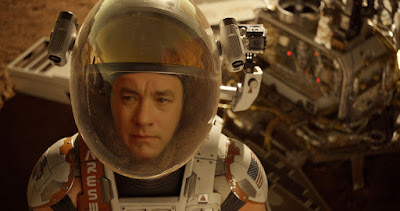Naturally I looked up the trailer and lo, it was awesome. Then I promptly forgot about the whole thing until the beginning of the month when I finally decided to buy the book before the film came out, cause I'm that asshole who likes going to a movie and whispering to my neighbour "actually, in the book, they did this..." in every scene. I go to the cinema on my own a lot now, no idea why...
The story is very simple: Mark Watney, a botanist and engineer on the third manned mission to Mars, ends up stranded on the planet and presumed dead after an evacuation during a sandstorm goes wrong. That's...it really. The book follows his, wait for it, desperate battle for survival (aw yeah, I'm a super original journalist) against the harsh Martian environment armed only with spare parts and lots of duct tape. Think of either the bit in
Apollo 13 that the comic mentioned or that part in
Castaway when he opens all the FedEx parcels to make tools, then spread it over 300 pages. It's awesome. Really, in retrospect, Watney's part was made for Tom Hanks, not Matt Damon, but y'know.
Now, the premise of a scientist tinkering with pipes and machinery for a whole book either sounds like the best thing ever or your worst nightmare; but have no fear, Little Miss I-Hate-Cool-Things, cause Andy Weir has your back. In the hands of many writers, describing constant problem solving, no matter how life-or-death-high the stakes may be, would eventually stagnate into a tedious "he did this, then that happened" rhythm. Weir manages to counteract this, firstly, with a splendidly witty yet realistic character: Mark Watney is quite simply the most charming young man ever to get stranded in space. He can be rattling off back-of-the-napkin calculations about how soon his food is going to run out while simultaneously pondering the mammal-wrangling capabilities of Aquaman and how silly
Dukes of Hazzard is. Weir has managed to create a character with all the background and knowledge he'd need to survive his ordeal while making sure he's as relatable as possible to the audience.
The long and short of it is he's wonderful; and I have a feeling a lot of that comes from Weir himself, who is the nerdiest human alive (a computer programmer born to a particle physicist and an electrical engineer, with a love of role-playing games) and simply adorable. Lookit him!
 |
| He looks like Stephen King got fused with a 19th century chimney sweep. |
Watney makes all the big science jumbo digestible for us plebs, but even so a whole book of one guy tinkering might tire after a while. Weir has countered this by chopping up the big long sections of sciencing with what's going on back home on Earth. And what's going on is everyone is losing their collective shits, that's what. Imagine that reaction when someone realises they've left their pram at the supermarket, but exponentially larger.
 |
| "MY BABY!!!" |
You might recogni
se this extract from the movie's trailer:
"If a hiker gets lost in the mountains, people will coordinate a search. If a train crashes, people will line up to give blood. If an earthquake levels a city, people all over the world will send emergency supplies. This is so fundamentally human that it's found in every culture without exception. Yes, there are assholes who just don't care, but they're massively outnumbered by the people who do."
Every story has a moral to it, and
The Martian's is certainly that when it really comes down to it, people can put aside their differences to help someone who is really in need. Yes, it's a bit hokey and sentimental, but... Yeah, it's just plain hokey. Even so, it's nice to see someone having a bit of optimism in their writing, and the parts of the book showing Earth knuckling down together to get Mark home are some of the most satisfying parts of the novel. We're all too bloody cynical and it's about time we enjoyed a bit of gultless pie-in-the-sky idealism; I take back the hokey thing. I'm sorry, Andy.
 |
| "S'alright, guv." |
What about the meat of the book though? The science in a hard sci-fi novel has to be good; and golly, it is splendid in
The Martian. I mentioned a minute ago that Watney acts as a bit of a filter for the audience to help understand everything that's going on, but that's really just a round-a-bout way of saying that Andy Weir should get a job as a lecturer. He's a wizard when it comes to explaining the complexities of biology, engineering, space flight, programming, and god knows what else. You'll finish the novel feeling like you could apply for a job at NASA (note: maybe don't) with the way he manages to gradually lay more and more complex information on you like a delicious knowledge sandwich.
 |
| "Mmm, science." |
Right, I think I should stop there. This book is fun, interesting, and even surprisingly touching at points. The science is understandable but meaty, and Andy Weir is wonderful. That is all.









No comments:
Post a Comment